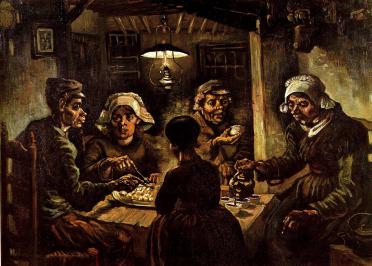Every week, parshaoftheweek.com brings you a rich selection of material on parshat hashavua, the weekly portion traditionally read in synagogues all over the world. Using both classic and contemporary material, we take a look at these portions in a fresh way, relating them to both ancient Jewish concerns as well as cutting-edge modern issues and topics. We also bring you material on the Jewish holidays, as well as insights into life cycle rituals and events...
One of the central features of the way the “social safety net” works in the west – whether it’s medical or disability insurance, income assistance, food stamps, whatever – is that before the state really helps you, you have to be in bad shape: poor, out of work, sick, with few if any assets; really out of it. I just heard on the news that in the run-up to the upcoming British elections, there is an argument going on about how much money and property should make a person ineligible for some sort of state assistance (I think it was a medical thing) – 100,000 pounds? 200,000? What about the value of your home? I know in the States this is a tremendous issue, with people not being eligible for Medicare (or is it Medicaid?) if they are too “rich”. The examples are many, as this is the basic concept: normal people, people who are OK, don’t get helped by the state. You have to first become abnormal- poor, sick, unemployed - to get our help.
Psychologically, this is interesting. It is almost as if we need to “other” a person - define them as beyond the pale of our own happy, successful normalcy, before giving them what feels to us like charity. The idea seems to be that normal people don’t need help, and can stand on their own two feet; it is only the obviously “other” poor person who gets the help we begrudgingly give to unfortunate failures. This might help explain the insane phenomenon of people voting against their own interest – working folks for Republicans, working folks in Israel for the nouveau Republican Likud: they refuse to identify as one of the losers, the objectified, vilified, and pathetic poor. They feel better insisting that they are on the other side of that divide. This explains the identification of a venal, spoiled, piggishly selfish billionaire as “a regular guy”, “a friend of the working man and the middle class”, etc. The working (as well as not working) poor who voted for Trump were identifying as NOT one of the pathetic, othered , usually dark-skinned, often Spanish speaking, poor – they were with the rich guy (who really doesn’t like those losers, he likes you normal folks, not those selfish, dangerous, undeserving poor).
In parshat Behar, we see a different approach. The Torah tells us that we need to watch our friends, our “brothers”, to see how they are doing. If they start to lose their financial grip, we are told to move in quickly and support them by giving them an interest-free loan. This is charity – I lose the money I could have made investing the sum I lent him – but not such a big deal: I’ll get it back, because I assume my help will keep him afloat and he will eventually be able to pay me back.
Rashi explains that the Torah is teaching us that it is much easier to give a guy a helping hand before he is destitute, rather than afterwards; now he just needs a relatively small loan to get over the hump and get back on his feet. Once impoverished, getting him out of that hole will require a lot more money, work, and effort.
Now the logic and practical economics of this is obvious, and it’s a shame that it is not understood in the modern world. But beyond that, more important than that, is that what the Torah does here is the exact opposite of the othering which modern social welfare systems insist on doing. This guy who needs a loan is just like you. The Torah again and again calls him your “brother”, and stresses that the goal is to keep him “with you” – a regular, accepted, productive member of society. By helping someone before he falls into poverty, with an interest-free loan, we are insisting that there is no great divide between normal folks and those who need assistance. We are insisting that we are all in this together, that we all have an obligation to be concerned if our fellow citizen is having a bit of a problem and, while he is still one of us, reach out and help him remain one of us, and not fall into the difficult status of “the poor”.
It’s about solidarity. Rather than saying that normal people can stand on their own two feet, and we will only help someone once we define them as abnormal, this mitzvah asks us to make sure that we understand that we all need help sometimes, even those of us who are still living in our own home, still able to afford things, but are just having a spot of trouble. That’s who we should help, not because they are not like us, but because they are.
Shabbat Shalom,
Shimon



Get inspired by Behar Divrei Torah from previous years